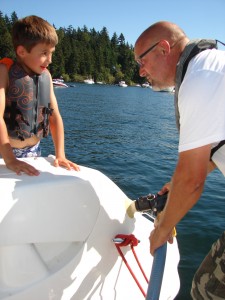Washington Boaters are increasingly utilizing their holding tanks and the ever-improving pumpout availability. It has been a combination of changing attitudes, private enterprise and public support. The public support has come largely in the form of Washington Sea Grant, which is involved in both public awareness and messy practical business of making pumpouts available.
Aaron Barnett of Washington Sea Grant reports that on Seafair weekend, 6,000 gallons of sewage was pumped at the logboom! It will be fascinating to see how this and other programs evolve. One thing is certain, our waterways will be better for it.
Here’s a story about one of Washington Sea Grant’s success stories, that of Terry and Sons Mobile Pump Out on Lake Washington:
From Washington Sea Grant
A year of free pumpouts makes Terry Durfee the most popular man on Lake Washington
Washington State Parks’ first free mobile pumpout service celebrates its first anniversary after diverting 61,000
gallons of raw sewage from Seattle’s lake waters.
Terry Durfee steers his aluminum skiff into the armada of boats anchored in Andrews Bay, off Seattle’s Seward Park,
and starts his rounds. The greetings start immediately: “Hey, Terry!” “How’s it going, Terry?” And, from one boat,
“Can you pump us out today, Terry?”
“I’ll catch you on the way back,” Durfee hollers over his shoulder.

Terry Durfee pumping out a holding tank near Seward Park on Lake Washington, under the watchful eye of a young boater.
Terry Durfee may be the most popular man on the lake, but what he does there is hardly glamorous. For nearly 600
recreational boaters, he’s Santa Claus in reverse, hailed not for what he brings but what he takes away: the
tankfulls of waste that once spelled an end to many a boating sojourn and, if they weren’t safely removed,
threatened water quality, aquatic organisms, and human health.
Durfee operates a pumpout boat, providing the first free tank-emptying service on some of Washington’s most popular
and vulnerable boating waters, Lake Washington and adjacent Portage Bay. His skiff is, in effect, a giant floating
shop-vac. Atop the aft deck sits a powerful compressor and an expandable hose long enough to cross two yachts to
service a third one. Underneath, invisible to view, is a 300-gallon holding tank, big enough to empty eight or more
typical pleasure-boat tanks. It takes him less than five minutes to spotlessly, odorlessly empty each one. He
records each on his iPad, where he also registers new customers, takes online reservations, and plots each day’s
course
This week marks one year since Durfee began offering the free service, with funding from the Washington State Parks
Department’s Clean Vessel Act (CVA) program. But it’s six years since he began pumping out holding tanks on Lake
Washington.
It all started when Durfee and his wife were living aboard their cabin cruiser at the Newport Marina, south of
Bellevue. The nearest shoreside pumpout station was 10 miles miles away at Kirkland’s Carillon Point, about 10
miles away in Kirkland. “It took two hours and at least $100 in fuel to get there, discharge, and come back,”
Durfee recalls.
He feared other boaters might not bother, but instead empty their raw sewage into the lake, in defiance of federal
law. So he bought the specially designed boat and began offering pumpouts to other boaters for $30 to $45,
depending on how far he had to travel.
Durfee’s Terry and Sons Mobile Pump Out built a base of 104 customers, but it wasn’t a moneymaker. “In five years I
never took a paycheck,” he says. He was ready to shut down when he learned that mobile pumpout services elsewhere
in the country had received federal CVA funds. Durfee called Washington Sea Grant, which partners with Washington
State Parks and the U.S. Sport Fishing Restoration Program in the Pumpout Washington campaign. WSG boating
specialist Adrian Barnett referred Durfee to Washington Parks’ CVA program, which agreed to fund 75 percent of his
$300,000 operating budget for a one-year trial. Marinas, yacht clubs, and other local donors provide the other 25
percent.
The first year of free pumpouts surpassed everyone’s expectations. Durfee’s customer list has quintupled to 593
and, he says, “that number grows every day.” He’s diverted more than 64,000 gallons – about 2,000 pumpouts’ worth –
of raw sewage from the lake and bay to safe treatment onshore.
Buoyed by that success, the Washington Parks CVA program has launched pumpout boats at Lake Sacajawea in Eastern
Washington and Tacoma’s Narrows and Foss Harbor Marinas. And it is renewing Terry and Sons’ contract for five more
years.
That’s welcome news for Lake Washington’s many boaters. “Terry does a great job,” said Todd Inslee as Durfee
emptied his cruiser’s tank. “He’s helped us on a few boats. And this is a smart thing for the environment.”
“Now that it’s free and easy, I’m trying to talk to the people I’ve heard leave their Y valves open because they
don’t want to deal with going to the pumpout,” said fellow boater Olinda Browne Blackburn. “I talk to them about
using Terry’s service, and so far I think it’s working.”
The U.S. Clean Vessel Act funds pumpout stations, pumpout boats, and other services that make pumping cleaner and
easier through taxes on recreational boats, fishing gear, and boat fuel. See pumpoutwashington.org for a Google map
showing all 150 CVA pumpout locations in Washington. If your yacht club or other organization would like
hand-frees, spill-free pumpout adapters for its members, contact Aaron Barnett at (206) 616-8929 or aaronb5@uw.edu.
Lake Washington boaters may schedule a pumpout at terryandsonsmobilepumpout.com or (206) 437-6764.
Based at the University of Washington, Washington Sea Grant provides statewide marine research, outreach and
education services. The National Sea Grant College Program is part of the National Oceanic and Atmospheric
Administration, U.S. Department of Commerce. www.wsg.washington.edu


